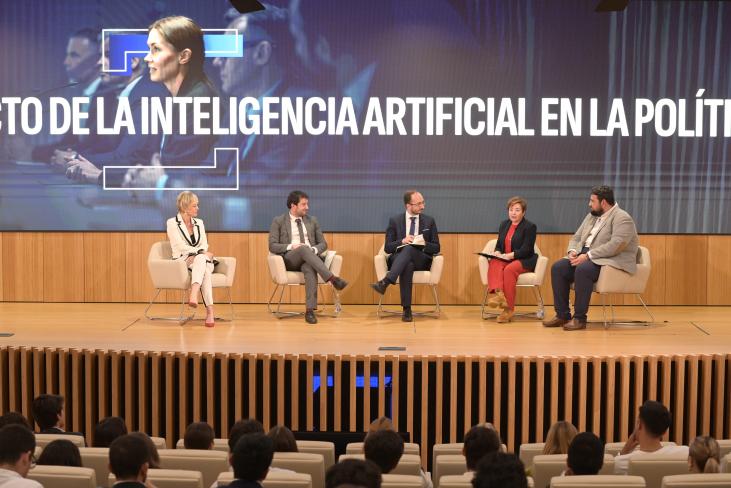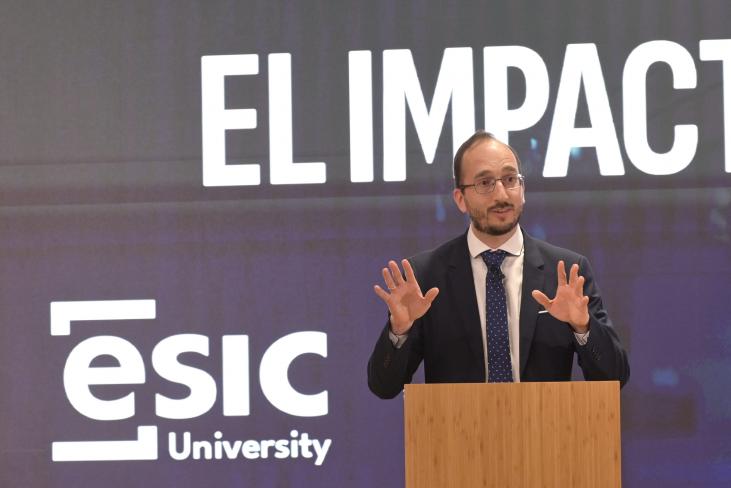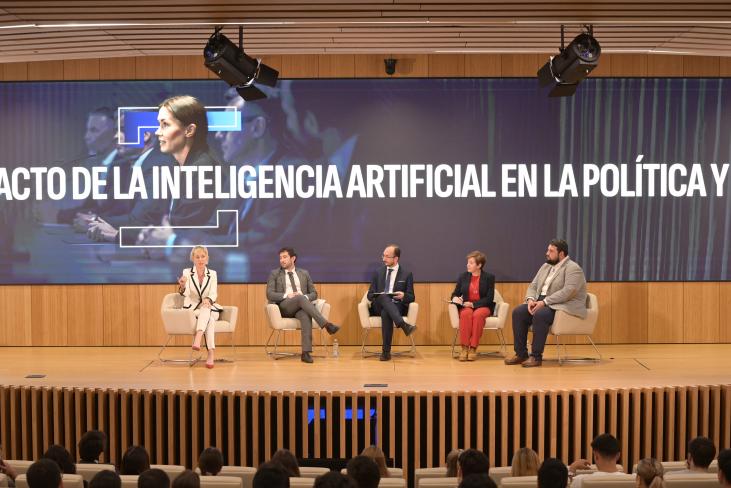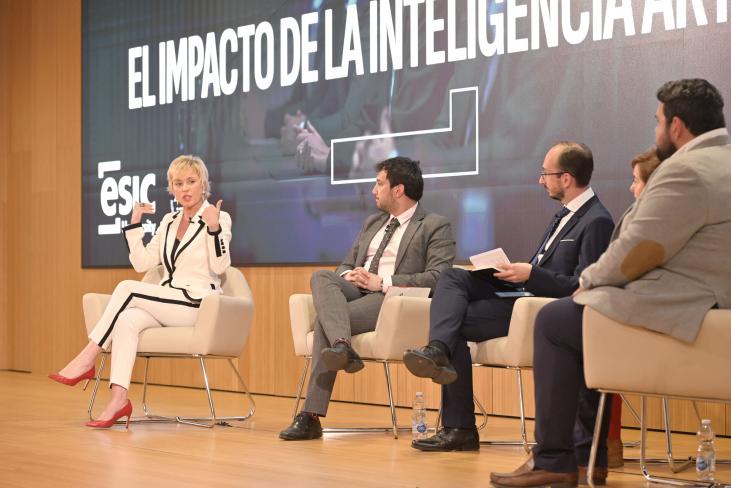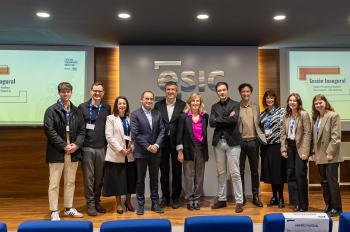ESIC News
Carme Artigas: “La regulación de la IA garantizaría su uso ético en política”
La jornada "El Impacto de la Inteligencia Artificial en la Política y Gobierno", organizada ayer por ESIC University y ALEPH reunió ayer a reconocidos profesionales del ámbito de la tecnología para compartir con los asistentes diferentes perspectivas sobre cómo inteligencia artificial (IA) está desempeñando un papel crucial en la toma de decisiones políticas y la eficiencia de los servicios gubernamentales.
Tras unas palabras de bienvenida por parte de Pablo Martín, director académico de la institución educativa ALEPH, que imparte junto a ESIC University el Máster en Marketing, Comunicación y Consultoría Política entre otros posgrados y cursos, tomó la palabra en primer lugar Carme Artigas, copresidenta del Órgano Consultivo de Alto Nivel sobre IA de la ONU y quien compartió su visión sobre cómo regular la IA para garantizar su uso ético y beneficioso en el ámbito político. “La ley europea es un gran hito, y también lo que estamos haciendo desde los órganos organizativos, ya que España es el primer país del mundo en elaborar una carta de derechos y criterios”, explicó.
Además, añadió que, desde diciembre de 2020, se reclamaba un derecho de la Inteligencia Artificial, que pudiera regular “que un algoritmo no discrimine el derecho a una segunda opinión humana cuando un sistema automatizado rechace el tratamiento médico, y nadie nos hacía ni caso. Cuando en Europa ya estábamos debatiendo los aspectos humanistas de la inteligencia artificial y cómo proteger los riesgos, todo el mundo nos miraba por encima, porque los procesos regulatorios europeos son bastante largos”. Para finalizar, concluyó que, en Europa, “regulamos los malos usos de la Inteligencia Artificial. No queremos nada que suponga una alteración en la mente humana y no queremos que la IA sirva para un control masivo de los gobiernos. Tenemos una conciencia total de que la Inteligencia Artificial, pero se debe hacer de manera internacional”.
Jesús Herrero, director general de Red.es, compartió diferentes ejemplos de cómo la IA está siendo implementada en proyectos gubernamentales en España. Entre ellos, destacó que “en Red.es aplicamos la tecnología en nuestros procesos, para ser más ágiles, más accesibles y hacer el procedimiento sencillo para las empresas, para los ciudadanos y para la propia administración. De hecho, la inteligencia artificial ha aumentado la productividad, aunque se pensaba que había llegado para eliminar el trabajo humano, pero no ha sido así. Nos hemos dedicado a crear nuevos programas que nos permite que los equipos se dediquen a escuchar a los ciudadanos”. Explicó, además, cómo con el programa Kit Digital, "Red.es ha diseñado un sistema que utiliza herramientas de robotización e inteligencia artificial que ha permitido que las comprobaciones puedan hacerse en tan solo 3 minutos consiguiendo que se concedan las ayudas en solo 15 días".
Por otro lado, Olga Gil, investigadora especializada en la regulación de la tecnología en el Instituto de Ciencias de la Computación Aplicada (ICCA) y la Escuela de Gobierno Complutense, habló sobre los avances y desafíos en la aplicación de la IA en el ámbito académico y gubernamental, haciendo hincapié en lo que compete a las universidades, donde destacó que “las áreas transversales que resuelvan problemas sociales son, ahora, el área donde tenemos que poner el foco. Los departamentos que trabajan de forma transversal compiten con una dificultad añadida. Y es que cuando presentas un proyecto especializado en un área, los evaluadores saben de un tema, pero no saben de todos”.
Gil incidió también sobre la importancia que tiene la alfabetización en términos de inteligencia artificial y saber cómo se utiliza un algoritmo, añadiendo que “el foco de las universidades es saber qué vamos a hacer con la inteligencia artificial. La regulación no es la única respuesta, tenemos muchos retos en Europa porque no debemos ser autocomplacientes, no tenemos las economías de escala que está tratando de construir la Unión Europea y nos falta un mercado cultural único.”
Y, por último, Román Robles, concejal de Contratación, Régimen Interior, Atención al Ciudadano y Administración Digital del Ayuntamiento de Galapagar, habló sobre AC Tool, un asistente virtual basado en IA diseñado para facilitar la comunicación y la toma de decisiones en el contexto político. Durante la explicación, puso en valor la importancia que tiene para él que el Ayuntamiento de Galapagar sea un referente en la innovación, donde explicó “montar tecnología por montarla no funciona, debemos tener un propósito. Tenemos que cumplir la hipótesis de que la inteligencia artificial puede ayudarme a mejorar los procesos, ya que podré hacer lo único que no puede hacer Chat-GPT, que es escuchar a mis vecinos”.
Concluyó su intervención con una reflexión: “Yo soy concejal, tengo que darles una atención excepcional a mis ciudadanos. Bajaba al registro y lo único que veía eran colas, y lo que hicimos fue investigar por qué los ciudadanos iban hasta la institución y crear una automatización del proceso y, puedo decir que lo hemos conseguido gracias a la inteligencia artificial.”
Todos los participantes en la jornada pudieron comprender y aclarar sus dudas sobre la intersección entre la tecnología, la política y el gobierno, y se abrió el debate sobre la posible sustitución de las personas por la inteligencia artificial, donde Carme Artigas compartió su opinión diciendo que “el perfil sustituible va a ser el del becario, por lo que se necesita una formación más temprana para que eso no suceda”.
Por otro lado, Olga Gil, en el ámbito de la educación destacó que “no hemos encontrado que el perfil del profesor sea sustituible, aunque las universidades estamos trabajando en implementar el uso de la inteligencia artificial de la forma más beneficiosa posible”.
Jesús Herrero, añadió que “la cuestión con la tecnología es casi de autoestima. El cambio está en la formación, pero también son muy destacables otras habilidades: cursos, autoformaciones y conocer el lenguaje de la inteligencia artificial.”
